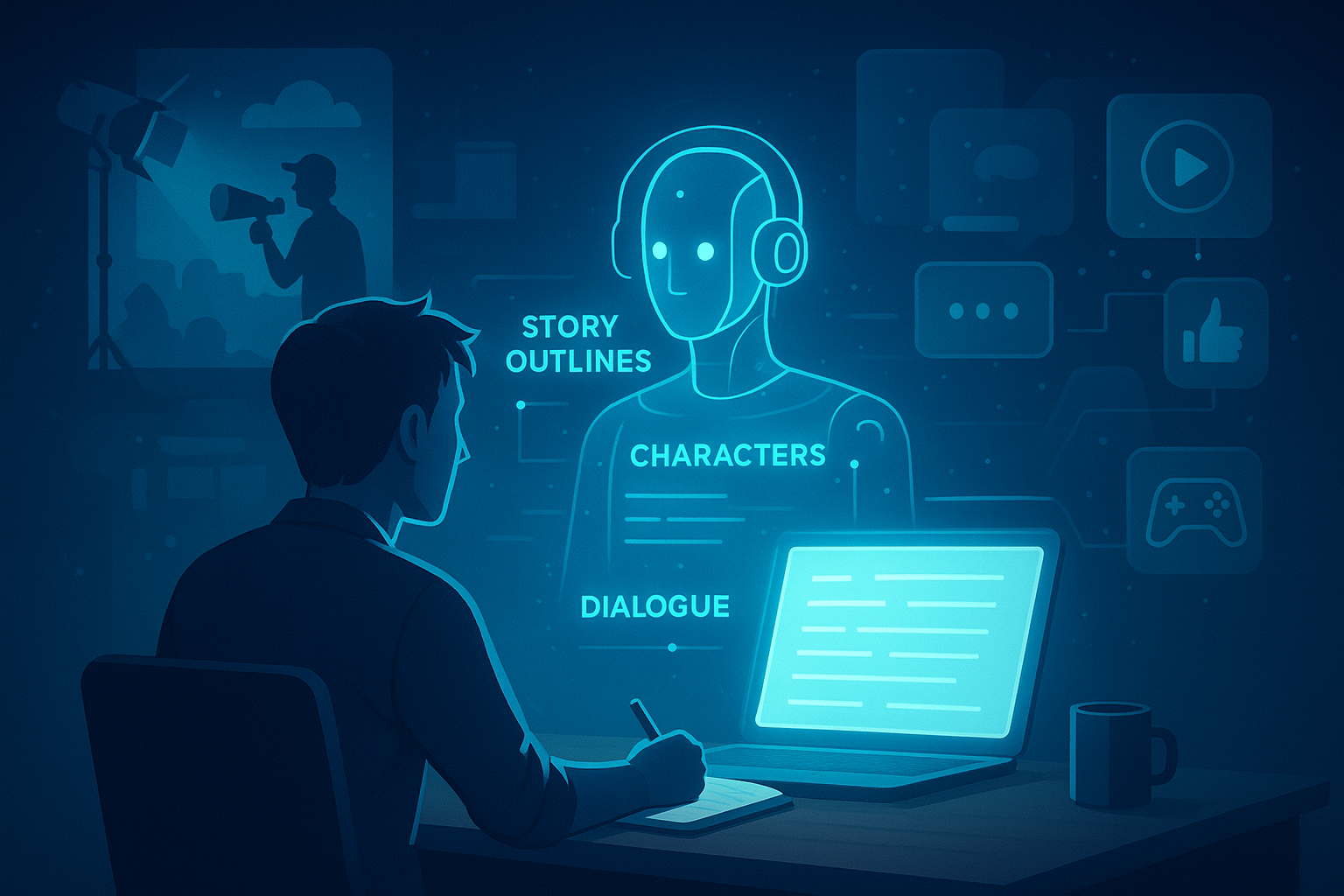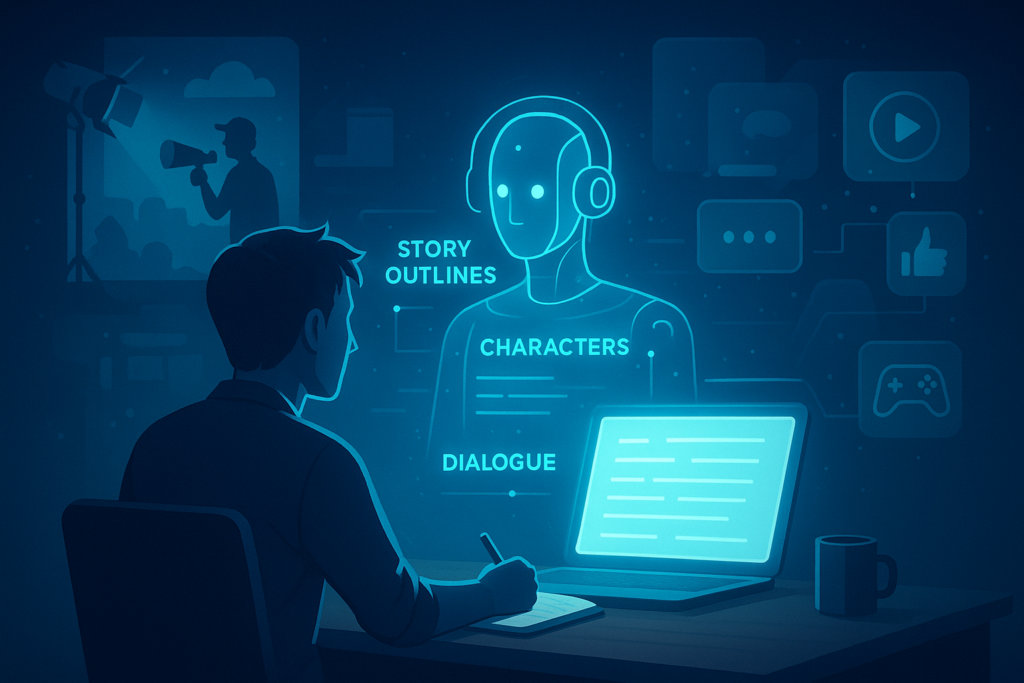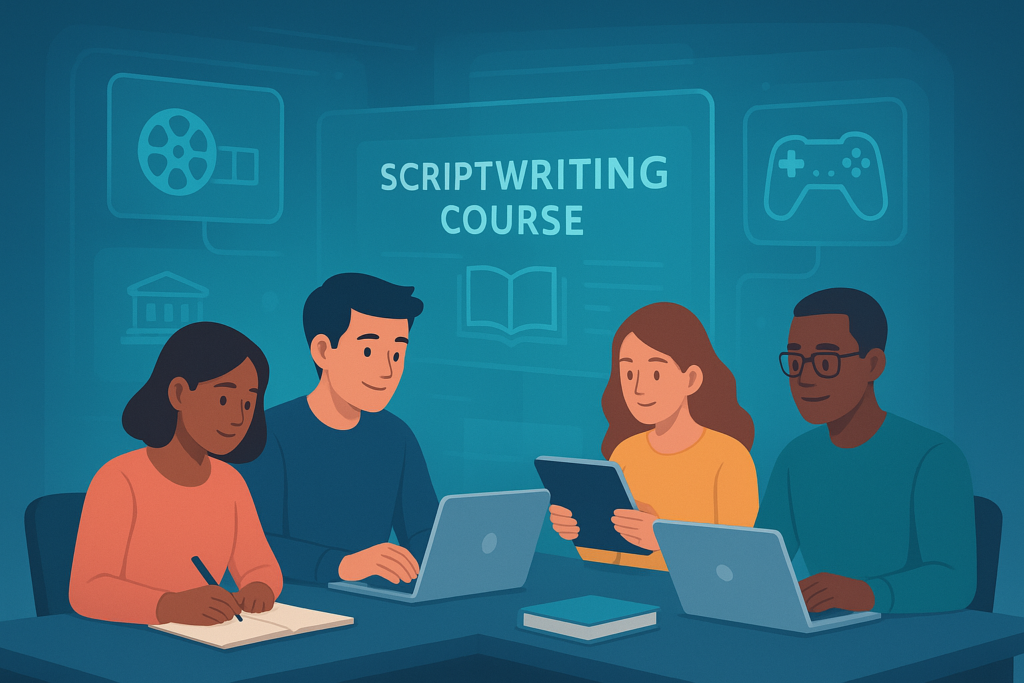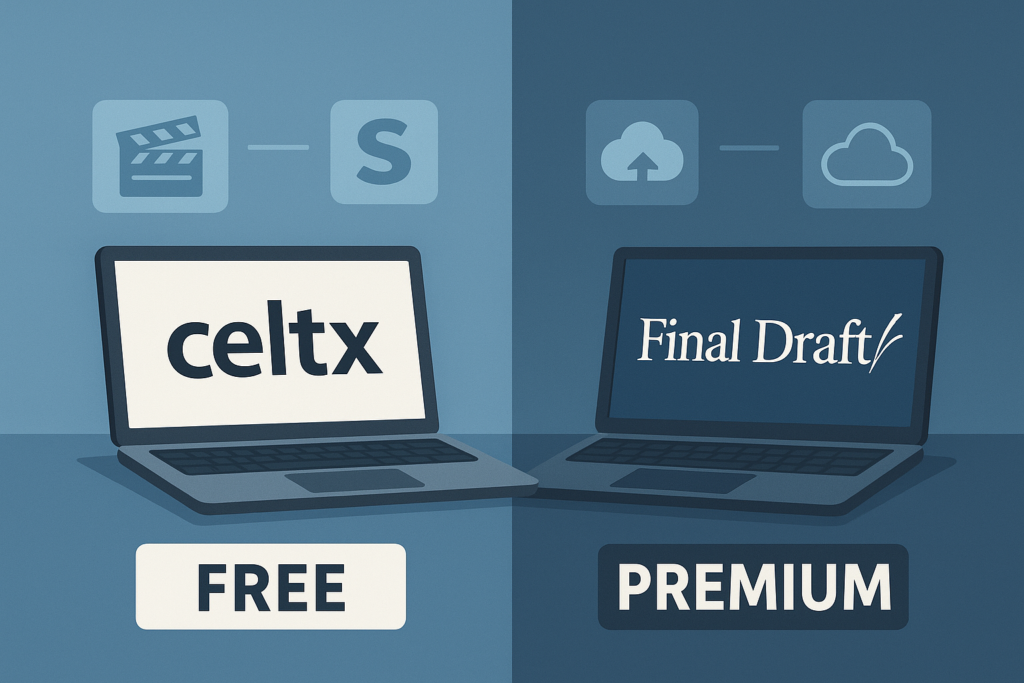Physical Address
304 North Cardinal St.
Dorchester Center, MA 02124
Physical Address
304 North Cardinal St.
Dorchester Center, MA 02124

AI script writing is opening a new chapter in the world of stories. Imagine a writer staring at a blank page late at night. The ideas are there but the words do not come. With one short prompt, an AI tool creates a plot, characters, and even dialogue. The page is no longer empty.
This is how AI is changing creative industries today. In films, it helps writers create stronger plots and faster drafts. In games, it brings life to characters that react and speak in real time. In interactive media, it builds many paths so each viewer or player enjoys a different ending.
In this blog we will look at seven powerful techniques of AI script writing. These techniques will show how AI helps writers save time, break writer’s block, and make stories more creative and exciting for audiences everywhere.

The Evolution of AI in Scriptwriting
AI script writing is changing how stories are created. In the past, traditional writers used pen and paper or typewriters to create scripts. Every scene, dialogue, and character had to be carefully planned. This was slow and time-consuming. With digital tools and scriptwriting software, writers could organize scenes, follow proper script writing format, and make edits easily. Automation and scriptwriting programs allowed writers to save time and focus on creativity. Today, AI script writing builds on these tools to make the writing process even faster and smarter.
AI in Games, Film, and Media
AI is now an important tool in games, films, and media. In AI in games, characters can respond to player actions, making stories dynamic and engaging. Film writers use AI script writing tools to draft dialogues, plan scenes, and explore story ideas faster. In interactive media, AI can create branching storylines so every viewer or player experiences a unique journey. Writers can use scriptwriting software free or premium programs to enhance storytelling.
Benefits of AI Script Writing
There are many reasons AI script writing is important. It helps with faster content creation, reduces writer’s block, and enhances creativity. Writers can use AI to generate ideas, improve dialogue, and follow script writing format easily. AI is also cost-effective, helping indie creators and studios produce scripts without large teams. Using AI in games, film, or interactive media, writers can focus on imagination while AI assists with structure.
Overall, AI is not just a tool but a creative partner. By combining scriptwriting applications, AI techniques, and modern storytelling methods, writers can create more engaging, innovative, and professional scripts for films, games, and interactive media.

AI has changed how writers start their stories. One of the most powerful techniques is automated story generation. This allows AI to create story outlines, suggest plot ideas, and even provide writing script examples in seconds. A writer only needs to type a few words about a character, setting, or idea. The AI then generates multiple options, helping the writer choose the best one.
For film writers, automated story generation saves a lot of time. They no longer need to spend days planning every scene manually. The AI can suggest the structure, pacing, and even story twists, allowing the writer to focus on creativity. In scriptwriting jobs, this technique helps both beginners and professionals produce professional scripts faster.
In games, AI helps create dynamic stories. AI in games can generate missions, quests, or storylines that adapt to the player’s actions. This makes the gameplay unique each time. Interactive media also benefits. AI can create branching narratives, where viewers or players experience different paths and endings. Writers can use interactive medium examples to test ideas quickly.
Automated story generation does not replace the human writer. Instead, it acts as a creative partner. Writers still apply emotion, style, and personal touch. Combined with scriptwriting software or scriptwriting software free tools, this technique reduces writer’s block and enhances creativity, making storytelling faster and more engaging.
Another powerful technique in AI script writing is character and dialogue creation. AI can generate realistic scriptwriting sample dialogues for characters in films, games, and interactive media. Writers can type a brief description of a character, such as personality, age, or role in the story, and the AI will produce dialogue that fits naturally. This helps writers maintain consistent character voices throughout the script.
In games, AI is especially useful for creating non-player characters or NPCs. AI can design unique personalities, speech patterns, and reactions in games. Players feel more engaged because every character behaves realistically and responds differently to choices. For interactive media, AI can also produce dialogues for branching storylines, ensuring that every path in the story is coherent and enjoyable.
AI uses natural language processing to understand tone, context, and style. This allows it to mimic how humans speak in different situations. Film writers can use this technique to draft conversations quickly and then refine them for emotion and pacing. Beginners learning script writing format or taking online scriptwriting courses can also practice creating dialogue with AI support.
Overall, AI for character and dialogue creation saves time, reduces writer’s block, and enhances storytelling. Combined with scriptwriting software or scriptwriting programs, this technique allows writers to focus on creativity while AI handles repetitive or time-consuming dialogue generation.
With the help of AI, writers can now generate scripts that mimic specific genres like sci-fi, drama, or fantasy, ensuring that the tone, pacing, and character development align with genre expectations. This capability is particularly beneficial for beginners learning the script writing format, as AI can provide structured examples that adhere to industry standards.
For instance, AI can analyze existing scripts and generate new content that matches the desired genre’s conventions. This process involves training AI models on large datasets of scripts from various genres, enabling them to understand and replicate the nuances of each style. Writers can input prompts specifying the genre and style, and the AI will produce scripts that reflect those parameters.
This technique is also valuable for online scriptwriting courses, where students can experiment with different genres and styles. By using AI-generated scripts as examples, learners can study how genre influences narrative structure and character development.
Moreover, AI’s ability to adapt to various genres and styles aids in scriptwriting contests, where participants can tailor their submissions to fit specific themes or genres, increasing their chances of success.
For a deeper understanding of how AI can mimic and blend writing styles, you can refer to this comprehensive guide: A Guide to Mimicking and Blending Writing Styles with AI.
AI script writing is not only useful for films and games, it is also very powerful in virtual media. One exciting technique is creating interactive and branching narratives. This means that AI can help writers create stories that change depending on the choices of the player or viewer. Each decision can lead to a different path, scene, or ending. This makes the story more engaging and personal.
In AI in games, branching narratives are very important. Players can make choices that change the direction of the game. AI can generate multiple story paths for the same game scenario. This allows game developers to create a more dynamic and replayable experience. The AI can write dialogues and events for each path so the story feels complete and natural.
In films or interactive videos, AI can also create branching storylines. Viewers can choose what happens next in the story. This makes watching more fun and interactive. Writers can use interactive medium examples to experiment with multiple endings or character paths. AI makes it faster to test ideas and create different versions of the story.
AI is also helpful in education and competitions. In scriptwriting contests, students or participants can use AI to explore branching narratives. This allows them to try new ideas without spending too much time writing every version manually. They can focus on creativity and plot design while AI handles the repetitive parts.
This technique also helps beginners learn the script writing format for interactive stories. They can see how choices affect characters, dialogues, and scenes. Using AI in interactive media encourages experimentation and learning in a structured way.
Overall, using AI for interactive and branching narratives makes storytelling more creative, faster, and more flexible. Writers can focus on imagination while AI helps organize multiple story paths. By combining this technique with scriptwriting software or scriptwriting programs, writers can create rich and engaging stories for games, films, and interactive media.

AI script writing is changing the way writers edit and collaborate on scripts. One of the most useful methods is real time script editing. With AI tools, writers can improve grammar, pacing, and dialogue instantly while they are writing. This saves time and helps produce professional-quality scripts faster. Using scriptwriting software or scriptwriting software free, writers can see suggestions from AI as they type. This makes the editing process easier and more accurate.
Real time editing also allows multiple writers to collaborate at the same time. In scriptwriting programs, different team members can work on scenes, dialogue, and storylines together. AI assists by keeping track of changes, maintaining the script writing format, and suggesting improvements. This is especially useful for films, games, and interactive media projects that have large teams.
Using AI for collaboration is one of the most powerful advanced techniques in modern storytelling. Writers can focus on creativity while the AI helps with technical tasks. It also allows beginners to learn faster because they can see suggestions for improvement in real time.
Another benefit is the ability to test different versions of the script instantly. Writers can create multiple drafts, compare them, and choose the best option. This flexibility is one of the key advanced techniques that professional writers use to save time and improve quality.
Finally, integrating AI in real time editing with scriptwriting programs or cloud-based tools is another advanced technique that helps writers work smarter. Writers no longer need to spend hours on repetitive edits or formatting issues. Instead, they can focus on dialogue, story, and character development. Real time script editing and collaboration with AI makes storytelling faster, more creative, and efficient for film, games, and interactive media.
AI script writing is not just about creating stories; it’s also about understanding how audiences will react to those stories. One of the most powerful advanced techniques is predictive analytics. This involves using AI to analyze data and predict how audiences will engage with a script or story.
AI can examine various factors, such as plot structure, character development, and dialogue, to forecast audience reactions. For example, AI can predict whether a particular plot twist will surprise or disappoint viewers. This helps writers and filmmakers make informed decisions about their scripts before production begins.
In scriptwriting programs, AI tools can provide feedback on elements like pacing and emotional impact, allowing writers to refine their scripts for better audience engagement. These tools can also suggest changes to enhance the story’s appeal based on predictive models.
Moreover, AI can analyze audience data from social media and other platforms to identify trends and preferences. This information can guide writers in creating content that resonates with their target audience. By understanding what audiences enjoy, writers can tailor their scripts to meet those expectations.
For a deeper understanding of how AI is transforming audience engagement in scriptwriting, do follow: AI and Predictive Analytics in Advertising.
In conclusion, integrating predictive analytics into AI script writing allows writers to anticipate audience reactions and make data-driven decisions. This advanced technique not only enhances the storytelling process but also increases the likelihood of a script’s success with its intended audience.
Script writing is not only about creating words and dialogues, it can also help writers visualize stories. One powerful advanced technique is AI-powered visualization. With this method, AI converts scripts into visual storyboards, helping writers, directors, and designers see the scenes before production begins.
For films, AI can take a script and show how characters move, interact, and deliver dialogues. In AI in games, visualization helps developers plan game worlds, character animations, and cutscenes. It allows teams to explore ideas quickly without spending hours on manual sketches or storyboards. Interactive media also benefits. AI can generate multiple paths for a story, showing different endings and choices in a visual format. This makes it easier to test how players or viewers will experience the story.
Using scriptwriting software or scriptwriting programs, writers can combine AI-powered visualization with other advanced techniques. This helps them maintain the script writing format while seeing how the story will look and feel in real life. Beginners can also learn faster by seeing their scripts come alive visually.
This technique improves collaboration. Writers, directors, and game designers can all view the same storyboard and give feedback. AI-powered visualization reduces mistakes and saves time while keeping creativity high.
To explore more about AI and storytelling, visit Iceberg AI Content.
In conclusion, AI-powered visualization is one of the most important advanced techniques in AI script writing. By combining AI in games, interactive media, and scriptwriting software, writers can create more engaging, immersive, and professional stories.
Creating scripts for films, games, and interactive media has become easier with modern scriptwriting software and scriptwriting programs. Writers can now plan stories, draft dialogues, and organize scenes more efficiently. Choosing the right tool depends on skill level, budget, and the type of project.

There are both scriptwriting software free options and premium programs. Free tools are ideal for beginners who want to learn the script writing format or practice creating scriptwriting examples. They usually include basic formatting, simple collaboration, and character organization. Paid software, or the best scriptwriting software, offers advanced features like real-time editing, AI-assisted dialogues, predictive analytics, and cloud-based collaboration. Professionals working on films, AI in games, or interactive media projects often prefer premium tools for their flexibility and efficiency.
Some popular tools include Final Draft, a premium software widely used in the film industry, and Celtx, which provides both free and paid plans. AI writing assistants are also growing in popularity. They help writers generate story ideas, create scriptwriting samples, and draft scenes faster. Combining these tools allows writers to maintain creativity while saving time on repetitive tasks.
Beginners can start with free tools or trial versions of premium software to practice formatting and storytelling. Professionals often select paid tools like Final Draft or robust scriptwriting programs for advanced collaboration. Consider your project type: films, AI in games, or interactive media may need different features. Choosing the right software improves workflow, enhances creativity, and helps writers produce professional-quality scripts efficiently.
Modern tools and advanced techniques are opening new doors for storytellers. One major opportunity is the democratization of storytelling. Anyone can now write scripts for films, AI in games, or interactive media using accessible scriptwriting programs. Writers no longer need large studios to create professional-quality scripts.
New technology also creates more scriptwriting jobs in interactive media. Game designers and media companies need writers who can produce branching narratives, engaging dialogues, and dynamic stories. Students benefit too. Many scriptwriting courses online teach these skills, making professional training accessible from anywhere. Beginners can learn the script writing format and practice with scriptwriting examples to improve their craft.
Despite these opportunities, there are challenges. Ethical concerns arise regarding ownership and copyright of AI-assisted work. Writers must understand how to protect their ideas. Overreliance on technology can also limit creativity if writers depend too much on software. Another challenge is bias in AI-generated content. Interactive media bias charts highlight how AI can reproduce stereotypes or unbalanced storytelling. Writers must carefully review outputs to ensure fairness and inclusivity.
Future scriptwriters need a mix of creative and technical skills. They should understand storytelling while being familiar with scriptwriting software and scriptwriting programs. Learning from scriptwriting books and taking scriptwriting courses online helps writers understand structure, dialogue, and pacing. Technical literacy allows writers to use screenwriting apps and AI tools effectively, enhancing productivity and creativity.
Career opportunities are diverse. Film studios hire writers to create professional scripts for movies and shows. The gaming industry needs writers for dynamic storylines, branching narratives, and character development. Independent writers can participate in scriptwriting competitions or produce content for media platforms. Using advanced techniques and modern software improves chances of success across these career paths.
The future of storytelling combines creativity with technology. Advanced techniques in scriptwriting allow writers to explore new ideas, create engaging narratives for interactive media, and design dynamic content for AI in games. Modern scriptwriting software and scriptwriting programs are powerful tools that enhance productivity, reduce repetitive tasks, and help writers focus on imagination and story development.
While technology cannot replace human creativity, it acts as a valuable assistant. Writers can leverage software, tools, and screenwriting apps to produce professional scripts, learn new formats, and participate in competitions. By exploring scriptwriting courses online and practicing with scriptwriting examples, both beginners and professionals can improve their craft. The key is to use technology responsibly, combine it with creativity, and embrace new techniques for storytelling in films, games, and media.